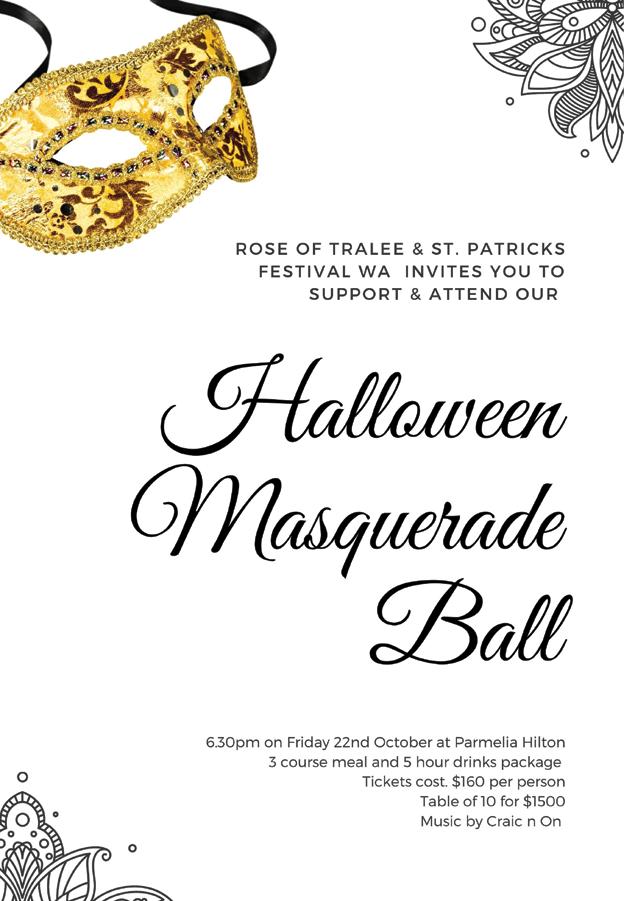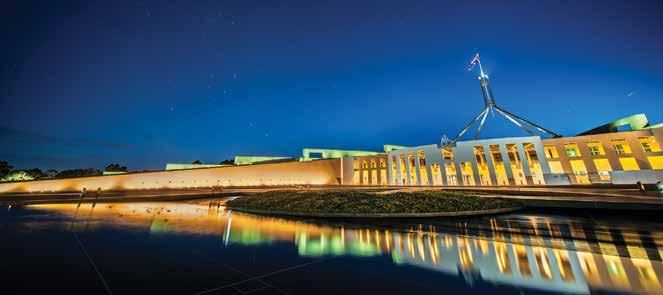
12 minute read
Isteach Sa Teach
BY LLOYD GORMAN
STATE DADDY FOR A DAY (OR FOUR)
Advertisement
You might not have realised it but for a brief stint recently an Irish man was in charge of Western Australia. From the 12th to the 16th of July, Dublin born Stephen Dawson, a minister in the McGowan government, was acting premier for the state while the premier himself – known increasingly as ‘State Daddy’ for his handling of the pandemic crisis – was having some downtime. It is not the first time an Irish born politician has stepped in to assume the reigns of the state but it has been some time since it last happened, possibly 120 years! The second premier of WA was one George Throssell, a native of Fermoy, Co. Cork. Throssell was was ten years old when his father, a Pensioner Guard, came to the Swan Colony in 1850 with his family in tow. The family settled in Northam where George became a successful merchant and mayor, and later was elected unopposed to the represent the town and district in the newly formed Legislative Assembly in 1890. Seven years later Throssell – who was known as The Lion of Northam – was appointed as the Commissioner of Crown Lands in the government of Sir John Forrest. It was a senior and significant role for the fledgling colony that was just about to go into a gold rush era. He got his chance at premier when Forrest dumped state politics to become an MP in the Canberra parliament of the newly Federated Australia. [Interestingly Forrest had been appointed as WA’s first premier by Governor William Robinson, born in Co. Westmeath]. Throssell succeeded Forrest as premier on 15 February 1901, but his term in office would be short lived. He was a very competent and capable administrator but he was quite deaf and not a natural political leader. But because of internal fighting between factions in the party and an election, Throssell lost his majority and resigned on 27 May to return to the backbench, just three months later. A few years later he retired to his stately home – called Fermoy after his birthplace– on the hill overlooking Northam.
Stephen Dawson (left) with Premier Mark McGowan
A DIPLOMATIC DESPATCH
Career diplomat Breandán Ó Caollaí made what must have been a flurry of apologies and farewells at the end of July. “My term as Ambassador of Ireland to Australia has come to an end and Carmel and I will be returning to Ireland on August 1st,” Mr Ó Caollaí told Irish Scene by email. “Unfortunately, this leaves us no time to organise a farewell event to thank and recognise all those like yourself who were so kind and supportive of us in our work here in Australia on behalf of Ireland. “I want to thank you most sincerely for the huge contribution you have made to recording and celebrating the activities and news
of the Irish community in Western Australia.” He said he appreciated the opportunities to send messages through the magazine to the Irish community. He added some kind words for the magazine itself. “I sincerely commend your publication in style, layout and content. I marvel that you can produce such a high quality publication on what I presume are limited resources. I know you will offer the same level of support and advice to my successor, Tim Mawe, when he takes up his appointment as you’ve offered me. Continued success in your enterprise.” The outgoing and incoming ambassadors will be trading places in a sense. Mr Ó Caollaí – a fluent Irish speaker – returns to the Dublin HQ of the Department of Foreign Affairs and Trade, where his successor was the director of the Asia Pacific unit.
IRELAND AND AUSTRALIA’S TIFFS AND TENSIONS
Ireland and Australia have had diplomatic ties since the end of World War 2, making this year officially the 75th anniversary of that relationship between the two states. While it is a formal arrangement it is also generally a cordial and friendly affair, but it hasn’t always been cosy. In fact, it went through a bad patch for about 20 years in the early days. In 1945, then Taoiseach Eamon de Valera visited Australia and held talks with Prime Minister Ben Chifley about the strong historical and cultural connections between the countries. As a result of that Ireland sent its first envoy – Thomas J. Kiernan – to Canberra. In return Australia appointed William Dignam as High Commissioner. But things soured when Ireland became a Republic and withdrew its membership from the Commonwealth of Nations, which have the English Left: Ambassador Breandan O’ Caollai virtual trip in Freo for Hand in Hand Festival. Above: Incoming Ambassador Tim Mawe (right)
From left: T.J. Kiernan, William Wynes
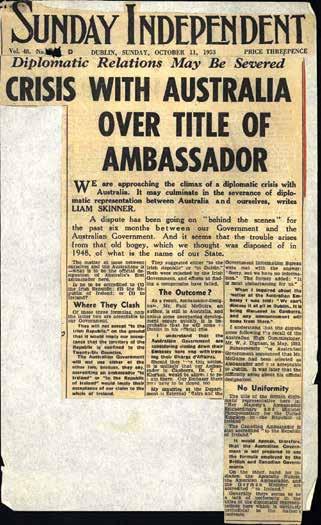
monarch as their head of state. The move did not sit well with the Australian authorities – whose natural affinity would be with the Brits – and when Kiernan was elevated from envoy to a full blown ambassador, his status was not properly recognised and reciprocated with an equivalent. Instead, Australia installed William A. Wynes as Chargé d’affaires (an ambassadors deputy) in Dublin in 1951. This was at a time when much of the world was still trying to find its way out of WWII hardships and grappled with the rise of the Cold War between the West and East. Indeed, it would not be until 1965 that Australia was prepared to forgive Ireland’s slight against the Commonwealth by appointing its first Ambassador to Ireland in the form of one Scottish born farmer turned politician Hugh Roberton, whose stint in the role would last between 1965 and 1967 only to be followed by a series of short lived replacements over the next decade. The issue of selecting the ambassador to Ireland in 1974 plunged Australia into a constitutional crisis, resulting in a dramatic double dissolution of both houses of national parliament. The so called “Gair Affair” deserves a story in its own right and is a fascinating episode that we will return to in another edition. In short, Labor Prime Minister Gough Whitlam offered the post of ambassador to Ireland to a nongovernment senator from Queensland, Irish Taoiseach Liam Cosgrave and Australian Vince Gair, in a Prime Minister Gough Whitlam bid to increase his party’s influence in the Senate at an upcoming general election. The contentious deal was shrouded in secrecy and all hell broke loose when the Sun News-Pictorial broke the story of Gair’s appointment on April 2. As a direct result of the revelation, the House of Representatives and Senate were staring into an early election which saw Whitlam’s Labor Party remain in office, but with a much weaker hold on power than it had before the crisis election. Despite all this, Gair – who had solid Irish credentials and heritage – took up his post in Dublin in May 1974 but “his behaviour there was often considered inappropriate and he was recalled by the Liberal-National Coalition government of Malcolm Fraser in early 1976”. Perhaps the whole sorry mess was the basis for an episode of the Australian political satire The Hollowmen. “The Ambassador” was the second programme in the first season of The Hollowmen in 2008. The plot revolves around a very grumpy government Senator who believes he should be rewarded for his loyalty to the party, and who could cause a lot of damage his own administration if he chose too. In return for his exit from politics and silence, the Senator demands compensation in the form the prestigious overseas diplomatic posting as High Commissioner to the UK just as the Prime Minister is about to announce that ambassadorships will only go to qualified and eligible career diplomats. Instead of the UK posting, the aides to the PM – the so-called Hollow Men – wrangle it that he is given the ambassadorship to Ireland instead, and a crisis is averted. The political satire is sometimes repeated on ABC television but you can easily find it – and this episode – on YouTube if you want to watch it.
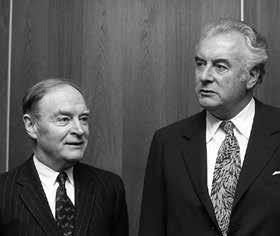
MATTERS OF GRAVE CONCERN
It might have a very dull name but a debate about the Administration Amendment Bill 2021 in the Legislative Assembly on August 19 revealed it is actually a question of life and death. During the debate on the matter, Kingsley MLA, Jessica Stojkovski (née O’Gorman) talked about the importance of wills, and was able to draw on some personal experiences and knowledge to show why. “It is really comforting to know that we now have those things written down, even to the point of what happens with our organs,” she said. “Do you want to be buried or would you like to be cremated? People have differences of opinion on that. I note that when one of my cousins in Ireland passed away, he had a requirement in his will for his partner to take his ashes to four different corners of the world, because travelling was one of the things they loved doing
together, so he felt that by putting that in his will, he would ensure her need to travel, even without him. Obviously she is not travelling anywhere right now, but she did make it to Australia, which was one of the places where he wanted his ashes spread.” While she said it might sound “a bit morbid” she urged her colleagues and everyone who doesn’t already have a will to get one as a “lasting legacy” for their loved ones. Research showed that nearly one third of people say they do not have anything of value to leave when in fact they often have superannuation and linked life insurance, both of which can be included in wills. “Many people do not turn their minds to how their superannuation and life insurance will be dealt with after their death,” she added. “This issue was highlighted by another of my lawyer friends, Lindsay, who also works at Vibe Legal. She gave me a really practical example. Lindsay, her husband, Leo, and I are all of Irish descent. They were born there and I was born here, but we are all in the Irish community and we have a great association called the Claddagh Association. We were talking about the fact that the Claddagh Association often assists in tragic circumstances in which young Irish expats are killed here in Western Australia, and about what happens when that occurs. Claddagh often steps into the breach and helps to repatriate the remains of those people back to Ireland.
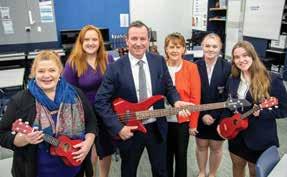
Jessica Stojkovski (second from left) with Education Minister Sue Ellery, Premier Mark McGowan, Warwick Senior High School principal Lesley Wintle and students Holly Dalliston and Alana Dooley.
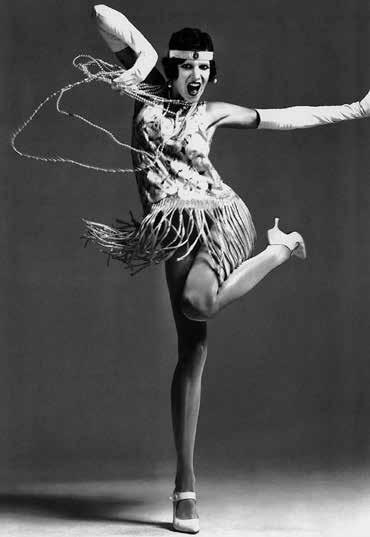
DONT FLAP ABOUT! GET YOUR WILL IN ORDER
15% OFF STANDARD WILL PRICING FOR ALL SENIORS
WILLS
ENDURING POWER OF ATTORNEY
ENDURING POWER OF GUARDIANSHIP
Protect yourself and your loved ones by ensuring that your Will is up to date and reflects your wishes.
ADVANCED HEALTH DIRECTIVES
Happy New Year to all our Senior Readers! Vibe Legal are happy to offer all Senior Card Holders 15% off our standard Will.
VIBE LEGAL Suite 6, 2 Hardy Street, South Perth WA 6151 admin@vibelegal.com.au vibelegal.com.au Contact our offices on (08) 6111 4890 for an obligation free discussion with our lawyers today
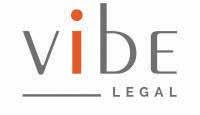
“Lindsay said that a lot of Irish expats who work here are working in the mining and construction industries and receive good wages and, consequently, good superannuation. That superannuation can be used to help in the process of repatriation so that the parents can bring their deceased children back to Ireland if they are killed in Western Australia. Under the current legislation, if a young Irish person is tragically killed and they do not have a partner or children, the parents will receive only $6,000, which is not enough to undertake both repatriation and a funeral; the rest is split between siblings and other family members. “Under the changes proposed in this amending legislation, that amount will increase to $56,500, which should, we hope, help to cover the costs of repatriation and a funeral. When you think about it, a lot of Irish expats who die in Western Australia are young people in their 20s, so their parents have to deal with both the loss of a child and the financial impact of bringing them back to Ireland,” she said.
A VETERAN OF IRELAND
The passage of the Veterinary Practice Bill 2021 through the Legislative Council gave one member of the Legislative Council an opportunity to fondly remember a trip he made to Ireland, although it was not quite clear when the visit happened. During the debate, Dr Steve Thomas, a Liberal Member for the South West Region – who was a working vet before entering politics – spoke about how the value of animals is much higher in some other parts of the world. “I went to have a look,” he said. “A friend of mine from Boyup Brook and I did a gentleman’s drinking tour of England and Ireland. It was one of my few holidays when I was vetting. It was absolutely great. We did the classics. We kissed the Blarney Stone. I think it broke in half when I kissed it; it was one of those things! “We stayed on farms. We saw the prices that people got for cattle and sheep. At that point, an Australian prime steer was potentially selling for, let us say, $A800. A steer in Ireland, because of subsidies, was selling for £1 a kilo. An $A800 steer was probably 400 kilograms. Therefore, at £1 a kilo, with an exchange of three to one—so, $A3 a kilo—that was $A1 200. They got a nearly £800 additional subsidy on top of that in three tranches. The animal was worth an enormous amount of money. Guess what happened? I could not believe it. We stayed on a dairy farm for something like a week and visited the local Irish haunts — where the locals go, not where the tourists go. It was brilliant. “But they called out the vet to vaccinate their stock and to treat all the things that farmers in Australia would treat themselves. If a dairy cow had mastitis, they would call out the vet. We would have made a fortune if the same rules applied here!”. ☘
Dr Steve Thomas

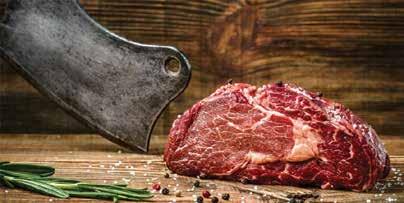
top quality farm reared meats and SPECIALTY irish items
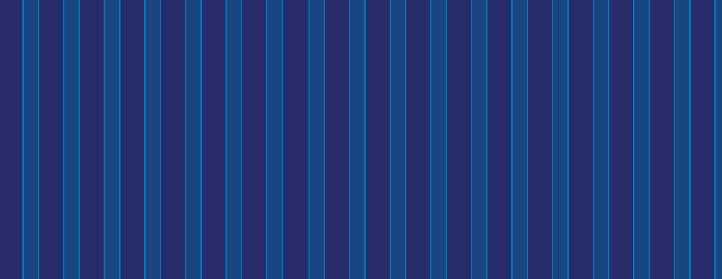
Shop 14, Woodvale Boulevard Shopping Centre 931 Whitfords Avenue, Woodvale WA 6026 P: (08) 9309 9992 E: meatconnoisseur@bigpond.com facebook.com/MeatConnoisseur 24 | THE IRISH SCENE
